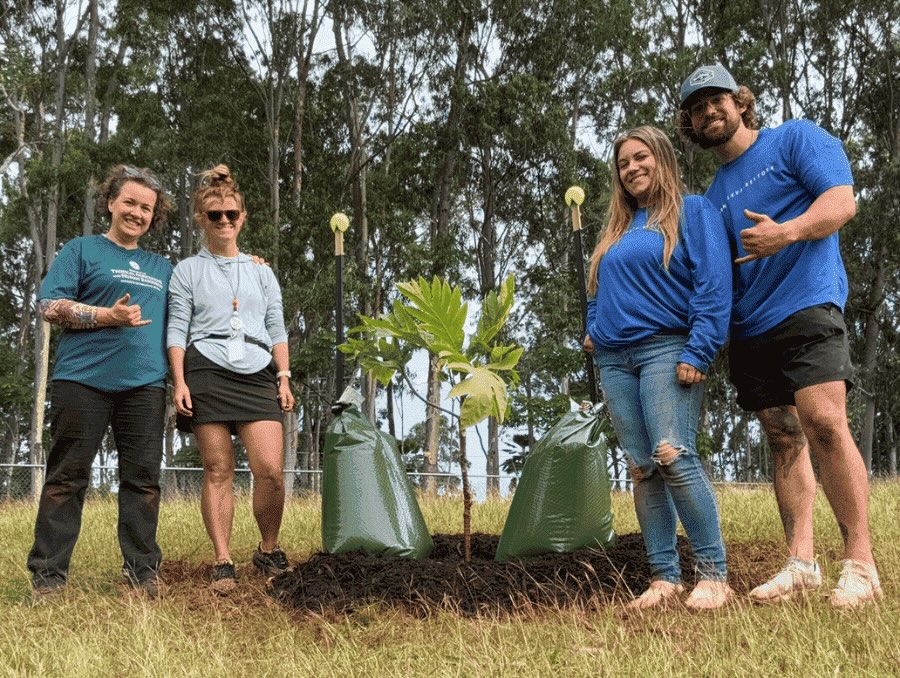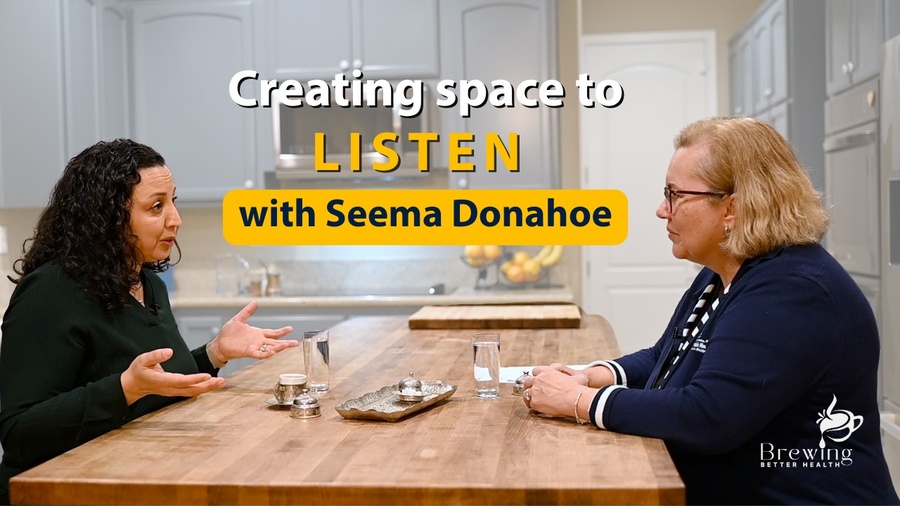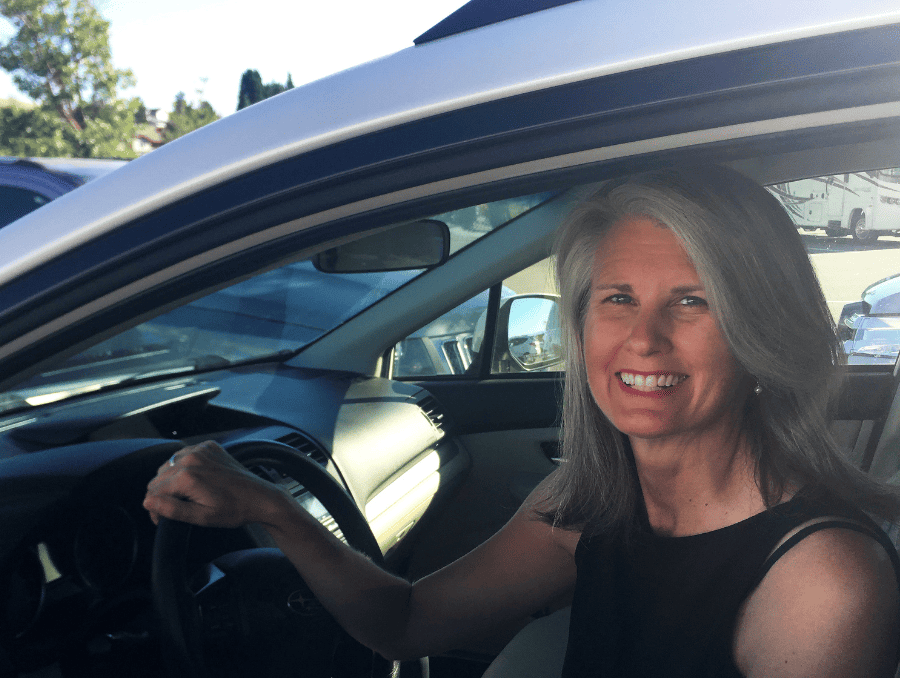Caden Salois ‘21, ‘25 MPH, MASUST, believes in the power of breadfruit so deeply he has a tattoo of one. The fruit is more than symbolic, for this recent School of Public Health online MPH graduate, it’s a cornerstone of his work in food justice, sustainable agriculture and cultural education as a farm to school support specialist with the Kupu ‘Āina Corps in Hawai‘i.
“The first time I tried breadfruit, it was in a lasagna,” Salois said. “That moment really opened my eyes to how versatile and meaningful this food can be.”
Breadfruit, or ‘ulu in ‘Ōlelo Hawai‘i, is a starchy, potato-like fruit native to the Pacific Islands. It’s high in fiber and nutrients, grows on trees for decades and is considered one of the most climate-resilient crops in the world. Breadfruit can be roasted, boiled, fried or mashed, and even turned into flour for baking.
Based on Oʻahu, Salois helped implement Kupu’s ‘Ulu in Schools project, which planted 63 breadfruit trees at K–12 campuses across the islands. Each tree is introduced through a traditional ceremony and supported by hands-on lesson plans that connect students to Polynesian agriculture, cultural practices and environmental stewardship.
The project addresses broader public health goals, including Hawai‘i’s reliance on imported food, rates of food insecurity and chronic illness, and the need to build local climate resilience. As Salois explained, school-based agroforestry could yield thousands of pounds of fresh produce each year while also reducing carbon emissions.
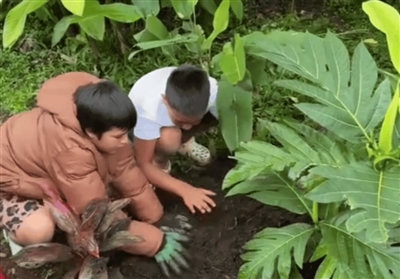
According to Salois, ‘ulu provides not only a nutrient-rich food source but also materials for tools, cloth, and ceremonial practices. It is an integral part of the Hawaiian way of life. “For our educators and food system stakeholders, revitalizing ‘ulu cultivation offers a tangible way to connect students with Indigenous knowledge, already being done in school garden programs that integrate ‘ulu-centered lessons on traditional farming, mo‘olelo (stories), oli (traditional chant), and mele (songs).”
While the trees can take up to five years to produce fruit, some schools have been able to harvest in as little as three years, Salois said the impacts are immediate, from increased student engagement to stronger teacher morale and community buy-in.
“Some of these students might never see the fruit before they graduate,” he said. “But they understand they’re planting something for their community, and that matters.”
“Teachers are staying after school to tend these trees. They’re excited to be outside, excited to teach,” he said. “This is about more than food, it’s about connection, well-being and giving people tools to thrive.”
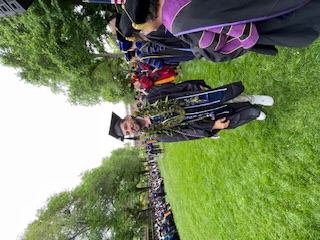
Salois earned his undergraduate degree in community health sciences at the University of Nevada, Reno, and decided to return for his Master of Public Health in 2022 through the School of Public Health’s Online MPH program. While simultaneously working on a Masters of Arts in sustainability in Hawai‘i, he chose the online format for its flexibility, allowing him to continue working and learning in the community while advancing his public health skills.
“I knew I didn’t want to leave the work I was doing here with Kupu, but I also wanted to keep growing professionally,” he said. “The online program gave me the chance to do both.”
Dr. Praveen Kumar Durgampudi, chair of the Department of Public Health Practice and director of online programs, said Salois represents the impact-driven student the program is designed to support.
“Caden’s commitment to sustainable food systems and community-driven health shaped by state policy goals aligns perfectly with our mission,” Durgampudi said. “He’s applying his education in real time, across the Pacific, and still contributing to his roots in Nevada. That’s the kind of reach and impact we aim to support.”
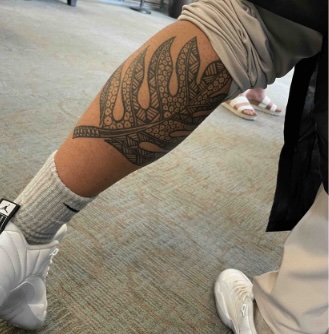
This longtime advocate for sustainability in rural communities calls Fallon home and hopes to bring similar programs to Nevada one day. “We could grow climate-resilient crops in Churchill County, too,” he said. “What I have learned is how environmental stewardship starts by listening to communities and designing systems that work for them.”
The School of Public Health offers both in-person and online MPH programs, designed to train public health professionals like Caden to serve their communities wherever they are. It is nationally ranked as one of the top 100 graduate programs by U.S. News and World Report.
“Caden’s work shows how our students are taking what they learn in the classroom to create meaningful change, whether they’re here in Nevada or halfway around the world,” said Muge Akpinar-Elci, M.D., MPH, dean of the School of Public Health. “We’re proud of how the Online MPH program is preparing the next generation of public health leaders to be flexible, skilled and deeply connected to community.”
With dual master’s degrees in public health and sustainability, Salois plans to continue building programs that nourish both people and places - one tree, one classroom, and one community at a time.
